Leading Cardinal: Science Incompatible with Catholicism
A Roman Catholic Cardinal who is close to Pope Benedict XVI has written an op-ed stating that the modern scientific view of Evolution is incompatible with Catholic teaching.
Leading Cardinal Redefines Church’s View on Evolution (NYT | RSS)
An influential cardinal in the Roman Catholic Church, which has long been regarded as an ally of the theory of evolution, is now suggesting that belief in evolution as accepted by science today may be incompatible with Catholic faith.
The cardinal, Christoph Schönborn, archbishop of Vienna, a theologian who is close to Pope Benedict XVI, staked out his position in an Op-Ed article in The New York Times on Thursday [RSS], writing, “Evolution in the sense of common ancestry might be true, but evolution in the neo-Darwinian sense – an unguided, unplanned process of random variation and natural selection – is not.”
In a telephone interview from a monastery in Austria, where he was on retreat, the cardinal said that his essay had not been approved by the Vatican, but that two or three weeks before Pope Benedict XVI’s election in April, he spoke with the pope, then Cardinal Joseph Ratzinger, about the church’s position on evolution. “I said I would like to have a more explicit statement about that, and he encouraged me to go on,” said Cardinal Schönborn.
Not really surprising. This is, after all, the same institution that took centuries to recognize the work of Galileo.

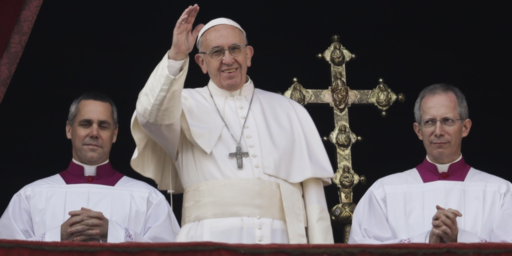
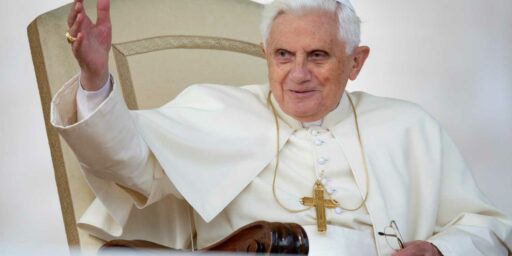
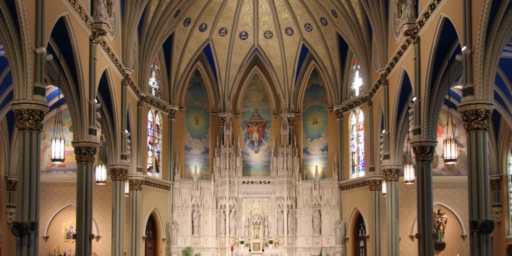
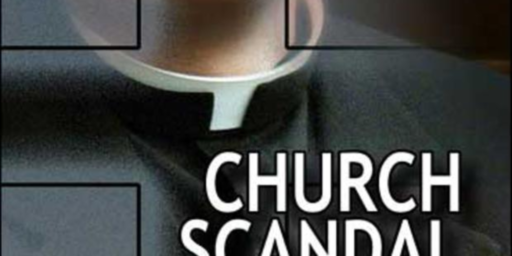
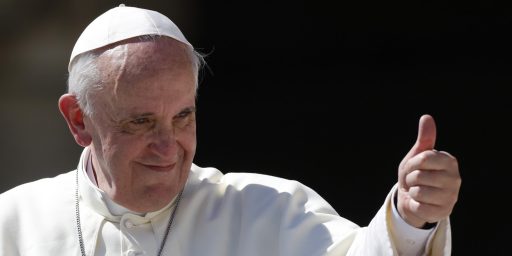
You know you’ve been watching too much baseball when you see a headline that says “Leading Cardinal: […]” and you immediately think Pujols.
Way to take a page from the Mainstream Media, James. Sensationalistic headline followed by story that is much less sensationalistic when you read it. Cardinal Schoenborn does not deny evolution and the science behind it, only the idea that God was not involved and nature unfolded randomly, not according to His effort. Perhaps you will next express your shock that Catholic clergy actually believe in God.
Is it too much to ask you to actually read the stuff you link to?
Today’s theory of evolution does not address the question of whether a god or an “intelligent designer” or mere chance started the universe. It merely says that whatever started the universe endowed it with a systematic method of moving from its initial state to its present state. This endowment included the use of randomness and survival of the fittest to blossom out to the diversity we see today.
That is entirely consistent with the Catholic dogma on a creator who made the endowment, though the scientific version of course does not mention who or what this endower might be, while the Catholic version does define him.
Cardinal Schoenborn incorrectly attributes an atheistic view to science and then argues against it. He should be admonished for the old debate trick of misstating your opponent’s views.
Intelligent design proponents have always ignored what to me is an obvious contradiction. If God is omiscient and omnipotent, why would he leave visible signs of his guidance in the evolutionary process? That smacks of imperfection.
A perfect, all-powerful God should have no problem designing a Universe by which Man arose through processes that obeyed an entirely self-consistent set of laws.
Your headline is misleading. Cardinal Schonborn did not say science is incompatible with Catholicism. He did say that one particular theory of evolution is incompatible with Catholicism. If your headline is correct, then why does the Vatican maintain an astronomical observatory?
So much the worse for Roman Catholicism, then.
The sensible RC position is “we don’t pretend to know exactly how God created the universe or humankind, but we’re confident he did so.” By definition, we can’t prove that what seems random to us wasn’t part of a Divine Plan.
That’s all the Church needs, and when it seems to want more, it’s pretty apparent that other motives than religion are at work. As Nietzsche observed, when you see a peculiar metaphysical position, ask yourself “what morality does this position aim at?”
Like many things, when you look closer you will find that they are not quite as simple as they appear.
Take for instance, Galileo’s inquisition by the Catholic church; was it purely a case of a man of science persecuted by a backward thinking clergy? No. The Church of the time had no problem with what could be proven. After all, the Church had its own scientists; the Jesuit brother Steiner was as forward thinking a scientist as they came. But, Galileo was promoting ideas far beyond what he could prove and he had serious personality defects. He was loud, insulting and wouldn’t listen to reason. He rejected, out of hand, Steiner’s explanation for comets because he hadn’t discovered the proof himself. Galileo thought that comets were optical illusions in the upper atmosphere. But, if Galileo had been able to share credit, Steiner’s explanation would have proven his theories. Many of Galileo’s ideas were later proven false, but he holds his reputation because he was lionized by the Anti-Catholic Protestant zealots of Northern Europe. Most of Galileo’s reputation rests on age-old religious propaganda and ignorance.
If you look into the Cardinal’s remarks, you see the same anti-Catholic bias. The Catholic Church is not denying that artificial selection can create new species, but it refuses to say that God has no hand in the matter. The question that a Catholic would have is “How much does God interfere?” An atheist would say that “God doesn’t interfere, because God doesn’t exist.” No Catholic priest will say that; why would anyone think that he would? Why is it news that people of faith believe that God works his way in the world? Is there any reason for God not to have created the mechanism by which evolution works: trial and error– DNA? Neither side can prove its case. So, why not leave this issue unresolved until we have proof?
If a churchman questioning neo-darwinism warrants the headline “Science Incompatible with Catholicism” then the following must lead us to a headline of “Science Incompatible with Science”:
Pierre LeJeune (geneticist who discovered the chromosomal abnormality in Down’s Syndrome patients):
“For all the proteins analyzed, more than 99% of the amino-acids are identical in man and in the chimpanzee. These same authors have compared, by molecular hybridization methods, the constitution of nucleic acids of the two species…As King and Wilson remark, the genetic differences between man and the chimpanzee appear extremely tenuous. For example, the differences observed between neighboring species of squirrels are notably greater. Between two species of frogs, they are thirty times more significant. It is necessary therefore to abandon definitely the view that small mutations can alone explain the difference between man and the chimpanzee. In other words, between the two species, the genetic vocabulary is common except for less than 1% variations, whereas the structure of chromosomes is notably different…It all seems to happen as if the genetic instructions being almost identical, the order in which they are expressed makes all the difference” *
and
“The neo-Darwinist is now reaching the point of dignity in the history of science that the Ptolemaic system in astronomy, the epicycle system, reached long ago. We know that it does not work. And that is interesting. Because from the actual structure of the chromosome we can demonstrate that the human species did not come from a progressive humanisation of a pre-human.”
*Jerome LeJeune, “On the Mechanisms of Speciation,” Proceedings of the Sessions of the Biological Society, Paris, Abstract 9, Volume 169, No. 4 (1975), p 828.
Mr. Joyner writes “Not really surprising. This is, after all, the same institution that took centuries to recognize the work of Galileo.”
First off it should be remembered that there was a Copernican revolution, not a Galilean revolution. Copernicus was the Catholic priest who was received with only the greatest esteem and approbation of other Catholic churchmen, and this was 75 years before Galileo.
As for your claim about the Church recognizing Galileo’s “work” it was actually an apology issued by JPII for Galileo’s treatment, not work – this treatment consisting mainly of house arrest in a Cardinal’s palace (most of us would welcome such treatment).
Additionally, anyone who accepts uncritically the Heliocentric over the Geocentric model is still a bit behind the times because as Alfred North Whitehead puts it:
“Galileo said that the earth moves and that the sun is fixed; the Inquisition said that the earth is fixed and the sun moves; and Newtonian astronomers… said that both the sun and the earth move. But now we say that any one of these three statements is equally true, provided that you have fixed your sense of ‘rest’ and ‘motion’ in the way required by the statement adopted†(1967 [1925], Science and the Modern World, The Free Press: New York, pp. 183–184).
And finally, it was Kepler’s model of the solar system, one with elliptical orbits of planets and which Galileo flatly rejected, that turned out to be the most accurate one of the time.
It’s hard to blame anyone for repeating the mythology though. These oft repeated one-liners about Galileo are merely part of the journalese that substitutes itself for thoughtful discussion.
Thank you for providing this space.
What a surprise. A sensationalistic headline that bears little resemblence to the article it leads. A Cheap-shot at Roman Catholics and their Church’s leadership based on hyped myths uncritically accepted by todays MSM. A clear axe to grind concealed in implicit hand-wringing over the Church’s alleged medevalism.
All because Christopher Cardinal Schönborn clarfies the Catholic teaching that God, and not simply some materialistic or random, is ultimately responsible for creation, however evolutionary or radical its development.
How pathetic. How sadly predictable. How Reasonable.
You misrepresent what happened in the Galileo case. Galileo was tried for stating the Church should revise the Bible to conform with his then unproven scientific theories, not because he said the Earth revolved around the Sun. Galileo was brought before the Inquisition for pretending to be a theologian, not for his work as a scientist.
Other Church astronomers had reached the same conclusion beforehand.
By continuing this lie, you only continue centuries’ old bigotries and hatreds against Catholics and the Catholic Church.
Galileo, hmm, he would be the guy that took the brave stand of saying that rather than the universe revolving around the earth, the universe instead revolved around the sun. Quite the scientist there. I can see why you Evolutionist zealots like him so much.
“History Incompatible with ‘Outside the Beltway'”
That seems to be the best conclusion we can draw from the misunderstandings here (pointed out by previous comments) about Galileo and the Church.
The Galileo misunderstanding is widespread and dominant. (Does that excuse it?) Also widespread and dominant is the belief that if a theory of origins is open to extra-natural intervention, then it is not science. It ain’t necessarily so. Since links don’t seem to be enabled in this blog, I’ll suggest you Google on “Stephen Meyer design descent” (without the quotes) and look at the first result.